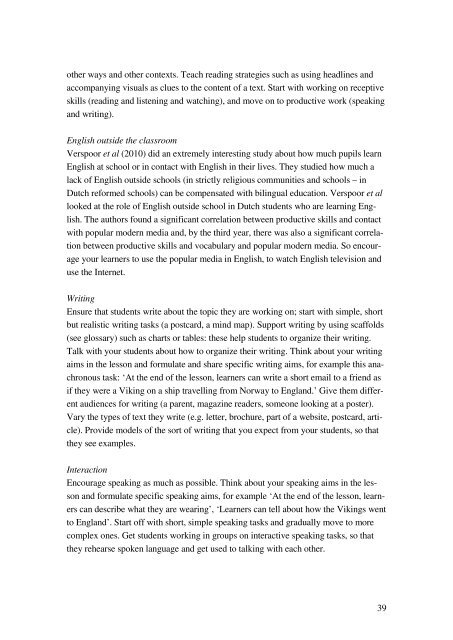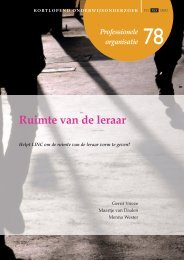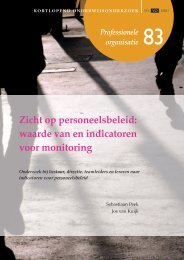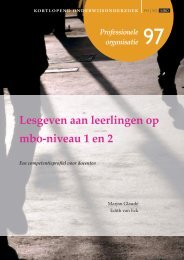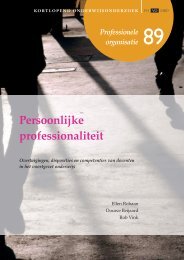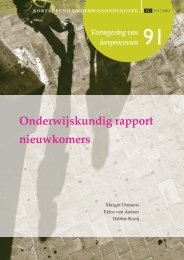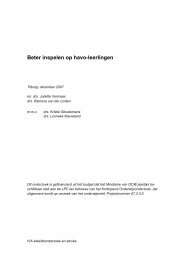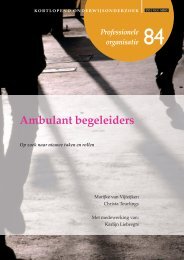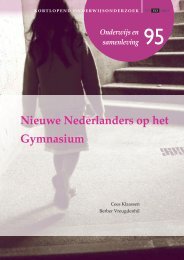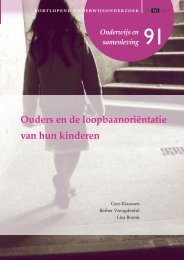Proud to be tvmbo - Kortlopend Onderwijsonderzoek
Proud to be tvmbo - Kortlopend Onderwijsonderzoek
Proud to be tvmbo - Kortlopend Onderwijsonderzoek
Create successful ePaper yourself
Turn your PDF publications into a flip-book with our unique Google optimized e-Paper software.
other ways and other contexts. Teach reading strategies such as using headlines and<br />
accompanying visuals as clues <strong>to</strong> the content of a text. Start with working on receptive<br />
skills (reading and listening and watching), and move on <strong>to</strong> productive work (speaking<br />
and writing).<br />
English outside the classroom<br />
Verspoor et al (2010) did an extremely interesting study about how much pupils learn<br />
English at school or in contact with English in their lives. They studied how much a<br />
lack of English outside schools (in strictly religious communities and schools – in<br />
Dutch reformed schools) can <strong>be</strong> compensated with bilingual education. Verspoor et al<br />
looked at the role of English outside school in Dutch students who are learning English.<br />
The authors found a significant correlation <strong>be</strong>tween productive skills and contact<br />
with popular modern media and, by the third year, there was also a significant correlation<br />
<strong>be</strong>tween productive skills and vocabulary and popular modern media. So encourage<br />
your learners <strong>to</strong> use the popular media in English, <strong>to</strong> watch English television and<br />
use the Internet.<br />
Writing<br />
Ensure that students write about the <strong>to</strong>pic they are working on; start with simple, short<br />
but realistic writing tasks (a postcard, a mind map). Support writing by using scaffolds<br />
(see glossary) such as charts or tables: these help students <strong>to</strong> organize their writing.<br />
Talk with your students about how <strong>to</strong> organize their writing. Think about your writing<br />
aims in the lesson and formulate and share specific writing aims, for example this anachronous<br />
task: ‘At the end of the lesson, learners can write a short email <strong>to</strong> a friend as<br />
if they were a Viking on a ship travelling from Norway <strong>to</strong> England.’ Give them different<br />
audiences for writing (a parent, magazine readers, someone looking at a poster).<br />
Vary the types of text they write (e.g. letter, brochure, part of a website, postcard, article).<br />
Provide models of the sort of writing that you expect from your students, so that<br />
they see examples.<br />
Interaction<br />
Encourage speaking as much as possible. Think about your speaking aims in the lesson<br />
and formulate specific speaking aims, for example ‘At the end of the lesson, learners<br />
can descri<strong>be</strong> what they are wearing’, ‘Learners can tell about how the Vikings went<br />
<strong>to</strong> England’. Start off with short, simple speaking tasks and gradually move <strong>to</strong> more<br />
complex ones. Get students working in groups on interactive speaking tasks, so that<br />
they rehearse spoken language and get used <strong>to</strong> talking with each other.<br />
39


